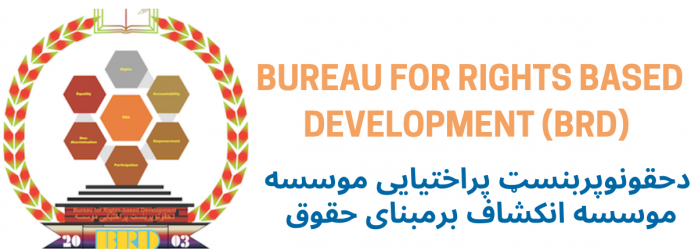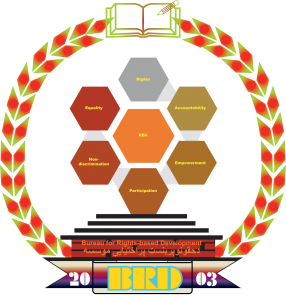BRD’s Vision

BRD’s vision is of an Afghanistan where the entire population lives with improved livelihood, social justice, peace, prosperity, and improved human rights, where the citizens has active role in determining the values and governance of the country.BRDs mission is to create an environment in which men and women are able to improve their standards of living through equitable and sustainable use of resources, with special considration of women, children and minorities.
The core objectives of the Bureau for Rights-Based Development (BRD) Afghanistan 2021-2025 Strategic Plan:
- Strengthened human rights- BRD aims to empower individuals, groups, and communities to respect and promote human rights BRD also aims to systemize and strengthen individual, civil society organization and community-based organization monitoring and advocacy efforts to ensure the state adhere to the national and international obligations towards human rights, sustainable development and environmental protections.
- Enhanced Democratic Governance- with aim to promote accountably and inclusiveness of public institutions and increase citizen participation in the decision-making process. BRD will also strengthen CSOs oversight capacity to monitor the performance of public institutions and promote and improve access to information in the target areas.
- Improved livelihood- BRD will promote social inclusion to improve social protection and reduce vulnerability and provide vulnerable populations with diversified livelihood options to be self-sufficient and to strengthen their resilience.
- Protect Culture Heritage in Risk: With the aim to provide urgent response to protect culture heritage in risk and empower communities to effectively engage in safeguarding preserving culture heritage in their village.
- Protect environment and adopt to climate change- Enhance the capacity of youth, CSOs and CBOs for civic action and raise wariness educated citizen on environmental and climate change issues
- Ensure that BRD is an efficient, effective, relevant, transparent and sustainable organization; under this SO, we will focus on strengthening the organization’s structure, systems and processes to ensure effective, efficient, and high-quality program delivery
The human rights-based approach to poverty eradication and development lies at the very heart of BRD’s work. BRD’s approach to poverty eradication starts with the connection between poverty and human rights, from the perspective of people living in poverty. As a rights-based development organization, BRD understands needs as the basis for claiming human rights, and supports marginalized people in their efforts to claim their rights.
BRD development programming are fully complement HRBA as we promote the development interventions that address both the demand and supply side, meaning the state as well as the people: empowering right-holders to know, claim, access and realize their rights. As state is with the obligations is primary duty-bearers under international law, however there other non state actors, the also hacve the responsiblities toward the rights holders, we target each using varies startegies, to keep them accountable. HRBA is also serve as the effective tool in our advoacy starategey for our policy advoaccy work at the national and international platform.
Our process of social change is founded on the HRBA principles and our rights-based development programming. We ensure our empowerment and awareness building programmes engage both people living in poverty and duty bearers to facilitate dialogue. We identify, analyze, and confront power basis that exclude and marginalize women and man, and in general the poor. We work in partnership with local CSO and community-based organization to harness their knowledge and skills to reach to the larger constituents; and with other stakeholders both at the national and sub-national level to leverage and influence policies, decisions, and to promote the state’s commitment to human rights and sustainable development to facilitate setting the ground for sustainable change.



